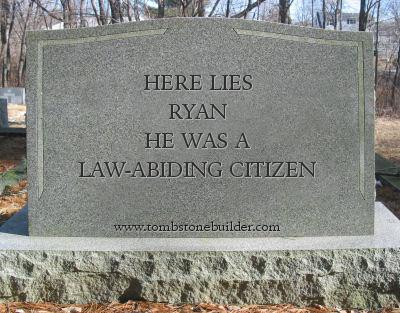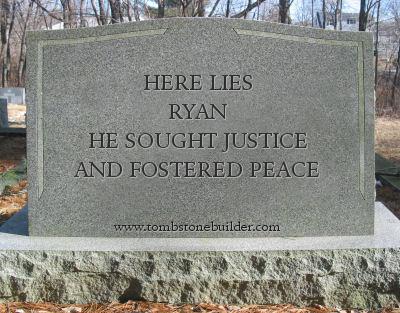
Well THAT epitaph is sure to get a lot of rubbings. Perhaps in the right cemetery, it might be a perfect fit. After all, there is something to be said about following the law. Indeed, in great measure, the safety and security of a community depends less on the ability to efficiently deter lawbreakers – or to swiftly punish them – than on the hope that the majority of citizens won’t break the law in the first place.
Still, the Lutheran notion that civil law is a gift from God meant to help us live lives in security and safety is an important one. It keeps Lutherans in a unique middle ground, between those who believe that being faithful means abandoning their identity as citizens of a country and those who believe that faithful citizenship means making sure all the laws of the land reflect their own religious beliefs. This is at the heart of that pesky “two kingdoms” stuff we Lutherans keep touting. God enables us to be citizens so we can exercise responsibility, live out our faith and serve our neighbors free of the chaos and fear of anarchy.
Lutheran citizens are neither expatriates nor demagogues. We don’t have to choose between abandoning our country and dominating our country in order to live in it faithfully. The law, for Lutherans, serves an important function, one which we support and one in which we are engaged.
So, why is my epitaph above still lacking a bit of luster? Why is it that I want to leave a mark on this world that goes a bit deeper than just being “a law-abiding citizen”?
Lutherans appreciate the law; we value it; ideally, we follow it (and, obviously, here we’re talking about civil laws, not the Law of God. That’s a topic for a different day.) But, we also recognize that the law isn’t good in itself. It’s good because of the purpose that God intends for it.
Laws, and the authorities that enforce them, are good because they keep us safe, they help organize our lives, and they help us live meaningfully and responsibly as members of a human community. They have a deeper purpose than merely commanding our obedience. We see this in how we talk about laws, in general. We don’t merely want enforceable laws; we want just laws. We don’t want laws that merely keep us safe; we want fair laws. We don’t want laws that merely constrain our lives; we want laws that enrich our lives. And we lift up these same qualities in ourselves and our leaders. In the 2009 Social Policy Resolution on immigration reform, the ELCA outlined this pretty clearly: “Governing authorities are to seek justice, foster peace, protect people, and support their well-being.” There is something more profound that we want for ourselves and for our community than merely obedience.

Aha! Now THERE’S an epitaph I can live with! (Umm…)
So often we get focused on obedience to the law without plunging deeper into the values that we, as law-making and law-abiding citizens, are supposed to pursue through this obedience. The rhetoric surrounding the immigration debate in the US is, tragically, a good example of this.
“We do not owe people who broke our laws to come into the country.” (Rep. Michelle Bachmann, R-MN)
“These illegal aliens are criminals and we need to treat them as such.” (Rep. Paul Broun, R-GA)
Outside the hallowed halls of government, how many of us haven’t heard some version of this sentiment: “But they’re here illegally! They’re criminals! They broke the law!” In the debate, we’ve lost touch with the notion that there is more to citizenship than obedience, and more to laws than merely restrictions. Good laws – like good citizens – reflect our deepest feelings about justice, fairness, and the common good. Good laws, like good citizens, enable and enrich life.
To what extent do current immigration laws do this? To what extent to they reflect – and form – a society that is just, where life is enhanced by opportunity and community? To what extent do they measure up to the vision Americans have of our nation, and how do they reflect the vision God intended for human laws and human societies?
As Rev. Stephen Bouman, the executive director of the Congregational and Synodical Mission Unit of the ELCA pointed out recently, over 24,000 unaccompanied minors crossed the border between Mexico and the United States in 2013. They risked starvation and violence to make the passage here, only to be incarcerated by the US when caught. It is no secret what led them to take this modern-day journey through the wilderness to a land of promise: violence, abject poverty, desperation.
Those who are not caught, incarcerated, or deported often find that the “promised land” is not without its own challenges. Of the estimated 11 million living in the US illegally, nearly 4 million are living in poverty. Even those immigrants who are living here legally still find themselves relegated to jobs, especially in food production and food service, that do not pay a living wage (See Bread for the World’s 2014 Hunger Report). It seems that even being “obedient” is not enough to feed one’s family.
Our tradition gives us a way of talking about immigration and the obstacles immigrants face. Citizenship, for Lutherans, is about more than following laws and paying taxes. It is about contributing to a community that reflects God’s good plans for human life. While never perfect, life within a political community now is supposed to give us a glimpse “through a glass darkly” of the perfect reign that we will experience in the Kingdom of God. This doesn’t mean campaigning for Christianization of the country. But it also doesn’t mean leaving laws behind, as if we are unconcerned. It does mean lifting up leaders and policies that serve the common good by enhancing our lives and by creating a community in which all who desire it can go beyond mere obedience and live meaningful lives as faithful citizens.
